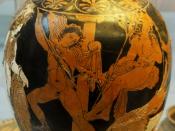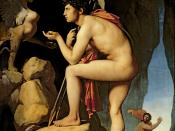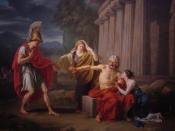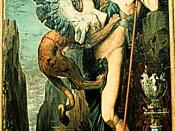Solving the riddle of the Sphinx earned Oedipus the kingship of Thebes. Although he liberated Thebes from the grasp of the Sphinx, he remained unaware that his own transgressions, killing his father and marrying his mother, would cause Thebes to suffer famine and infertility. Against the wishes of his less civically minded advisors, Oedipus acted for the common good by seeking to discover the truth regarding the murder of Laios, regardless of the potential consequences to himself. As both king and tragic hero, Oedipus ultimately chooses exile in order to punish himself and to save his country.
By crowning him king, the people of Thebes entrusted Oedipus to make decisions that would keep Thebes prosperous. He accepted this as his role and attempted to act in their best interest. From his opening line, "my children" to his final exile and Creon's comment, "leave your children," he held himself as king responsible for the welfare of his people.
When the Priest comes to tell him of the famine, Oedipus says "my spirit groans for the city, for myself, for you." His kingly attitude is reflected when he chooses to end the famine and thereby exiling himself by saying "the truth must be known." Although mortal, Oedipus appears god-inspired to the people of Thebes. In his first encounter with the city, the priest said to him " You are not one of the immortal gods, we know; â¦It was some god breathed in you to set us free." As a tragic hero, though, Oedipus yearns to know the truth about his past. As a child, he wanted to search for his identity after overhearing that Polybos did not father him. He said, "Yet the suspicion remained always aching in my mind; I knew there was talk; I could not rest." After hearing the oracle's prophecy, he fled Corinth thinking that he was protecting the best interest of his family and his people.
His hamartia both makes him king and leads to his demise. Killing his father allowed him to assume the kingship. But doing so, along with wedding and bedding his own mother, angered the gods and sent Thebes into a period of famine. After discovering his transgressions he understood the magnitude of his evil, saying of killing his father, "drinking my fathers blood, my own blood, spilled by my own hand," and of wedding his mother "O marriage, marriage! The act engendered me, and again the act performed by the son in the same bed." These deeds did, however, lead to his ultimate redemption and his ability to 'see' more clearly.
In his decisions, Oedipus acts as both a king and a tragic hero. After his revelation, he does not act the way a common man might. Instead he does what he swore he would do to the killer of Laos -- he exiles himself for the well being of Thebes. Thus he fulfills his responsibilities as a king and the duties that the Priest had placed in him when he said "Therefore, O mighty King, we turn to you: Find us our safety, find us a remedy." At the same time, as a tragic hero, he chooses the fate that the gods had ordained for him, as Creon told him "think no longer that you are in command here, but rather think how, when you were, you served your own destruction."





